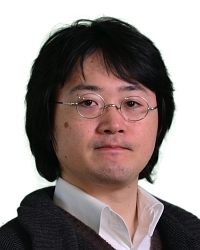TR2019-139
Variational Bayesian Symbol Detection for Massive MIMO Systems with Symbol-Dependent Transmit Impairments
-
- , "Variational Bayesian Symbol Detection for Massive MIMO Systems with Symbol-Dependent Transmit Impairments", IEEE Global Communications Conference (GLOBECOM), DOI: 10.1109/GLOBECOM38437.2019.9013363, December 2019.BibTeX TR2019-139 PDF
- @inproceedings{Wang2019dec,
- author = {Wang, Pu and Koike-Akino, Toshiaki and Orlik, Philip V. and Pajovic, Milutin and Kim, Kyeong Jin},
- title = {{Variational Bayesian Symbol Detection for Massive MIMO Systems with Symbol-Dependent Transmit Impairments}},
- booktitle = {IEEE Global Communications Conference (GLOBECOM)},
- year = 2019,
- month = dec,
- publisher = {IEEE},
- doi = {10.1109/GLOBECOM38437.2019.9013363},
- issn = {2576-6813},
- isbn = {978-1-7281-0962-6},
- url = {https://www.merl.com/publications/TR2019-139}
- }
- , "Variational Bayesian Symbol Detection for Massive MIMO Systems with Symbol-Dependent Transmit Impairments", IEEE Global Communications Conference (GLOBECOM), DOI: 10.1109/GLOBECOM38437.2019.9013363, December 2019.
-
MERL Contacts:
-
Research Areas:
Abstract:
In this paper, we propose a variational Bayesian inference approach for a low-complexity symbol detection for massive MIMO systems with symbol-dependent transmit-side impairments. This study is motivated by observations that realworld communication transceivers are often affected by the hardware impairments, such as non-linearities of power amplifiers, I/Q imbalance, phase drifts due to non-ideal oscillators, and carrier frequency offsets. Particularly, symbol-dependent perturbations are fully accounted into the designed hierarchical signal model as unknown model parameters. The developed variational Bayesian symbol detector is able to learn the unknown perturbations in an iterative fashion. Numerical evaluation confirms the effectiveness of the proposed approach.
Related News & Events
-
NEWS MERL Scientists Presenting 11 Papers at IEEE Global Communications Conference (GLOBECOM) 2019 Date: December 9, 2019 - December 13, 2019
Where: Waikoloa, Hawaii, USA
MERL Contacts: Jianlin Guo; Toshiaki Koike-Akino; Philip V. Orlik; Pu (Perry) Wang
Research Areas: Communications, Computer Vision, Machine Learning, Signal Processing, Information SecurityBrief- MERL Signal Processing scientists and collaborators will be presenting 11 papers at the IEEE Global Communications Conference (GLOBECOM) 2019, which is being held in Waikoloa, Hawaii from December 9-13, 2019. Topics to be presented include recent advances in power amplifier, MIMO algorithms, WiFi sensing, video casting, visible light communications, user authentication, vehicular communications, secrecy, and relay systems, including sophisticated machine learning applications. A number of these papers are a result of successful collaboration between MERL and world-leading Universities including: Osaka University, University of New South Wales, Oxford University, Princeton University, South China University of Technology, Massachusetts Institute of Technology and Aalborg University.
GLOBECOM is one of the IEEE Communications Society’s two flagship conferences dedicated to driving innovation in nearly every aspect of communications. Each year, more than 3000 scientific researchers and their management submit proposals for program sessions to be held at the annual conference. Themed “Revolutionizing Communications,” GLOBECOM2019 will feature a comprehensive high-quality technical program including 13 symposia and a variety of tutorials and workshops to share visions and ideas, obtain updates on latest technologies and expand professional and social networking.
- MERL Signal Processing scientists and collaborators will be presenting 11 papers at the IEEE Global Communications Conference (GLOBECOM) 2019, which is being held in Waikoloa, Hawaii from December 9-13, 2019. Topics to be presented include recent advances in power amplifier, MIMO algorithms, WiFi sensing, video casting, visible light communications, user authentication, vehicular communications, secrecy, and relay systems, including sophisticated machine learning applications. A number of these papers are a result of successful collaboration between MERL and world-leading Universities including: Osaka University, University of New South Wales, Oxford University, Princeton University, South China University of Technology, Massachusetts Institute of Technology and Aalborg University.


